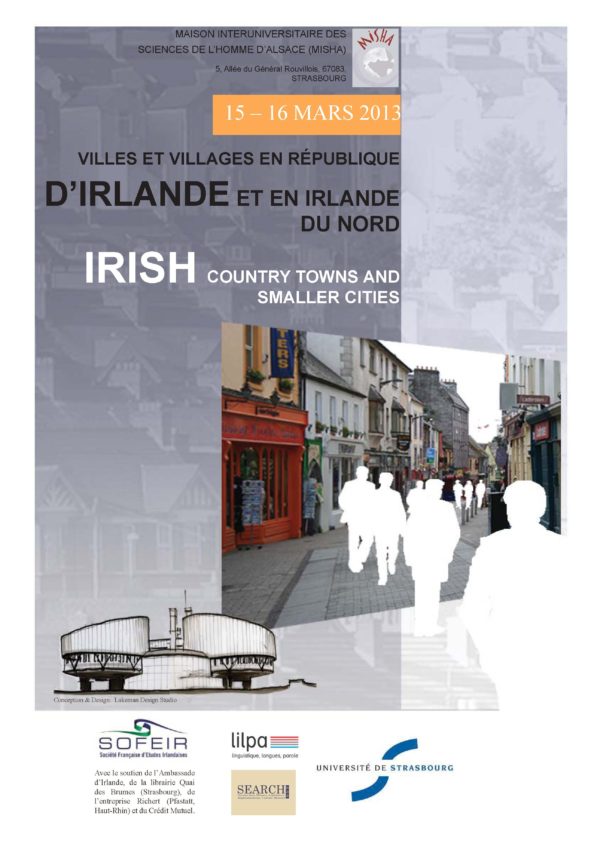
Villes et villages en République d’Irlande et en Irlande du Nord /
Irish Country Towns and Smaller Cities
« A love of beauty, so characteristic of many Mediterranean peoples, is hardly obvious in Ireland, for most of the towns are ugly except where the Georgian imprint remains, and even the churches are with some significant exceptions surprisingly unattractive. »
(T. W. Freeman, cité par J. H. Andrews, in Irish Country Towns, The Thomas Davis Lecture Series, Cork, Mercier Press, 1994, p. 179)
Ireland still conveys today the postcard image of itself as an essentially rural country. With the exception of Dublin, small and medium-sized Irish towns, (if measured by European standards), appear to have hardly mattered in the perception one has of Irish identity. Often reputed for being featureless, Irish towns, as a whole, have not led to extensive interdisciplinary research looking at a town’s multiple facets from a geographical, historical, political, socio-economic, religious, linguistic or cultural perspective. The relative lack of research interest in studying Irish towns is partly due to their small size and stature and partly to the fact that their development has generally been seen as a feature of colonization.
Nevertheless, an increasing interest in the preservation of heritage and three series of lectures on the theme of Irish towns (« Irish Country Towns » for the first two, and « Irish Cities » for the third), that were broadcast in 1991, 1993 and 1995 respectively under the title of the Thomas Davis Lectures, have brought out the crucial role towns have played in history and the vital influence they have exerted on their hinterland. The country’s economic development during the « Celtic Tiger » years, as much as the recent recession have also had a part in the ways the very « form » of a town may be said to have changed, some towns asserting themselves as regional capitals such as Cork, Limerick and Galway, for example, while others, such as Derry, are resolutely looking towards a serene future.
Consequently, given that small and medium-sized Irish towns whether they be market towns, religious strongholds, county capitals or provincial capitals, have been part and parcel of the Irish landscape, historically the vital centers of economic and cultural activities, we invite reflection on the make-up of urban Ireland, (Northern Ireland and Republic of Ireland). We favour an interdisciplinary approach and are open to comparisons with other European cities such as Strasbourg with its rich cultural, political and linguistic history and its double status as regional capital and European city.
From the perspective of historiography, one might look at the way the history of towns has been written, ranging from the monographies of the passionate local historian to more recent academic studies, thereby renewing interest in the origins of towns. Similarly, to be reexamined will be the significance of geographical criteria taken in an approach involving the interplay of history, sociology, culture and heritage studies, as one cannot easily « disentangle the roles played by geography and history » (Marcel Roncayolo, La ville et ses territoires, Gallimard, 1997, p. 20). Also of interest will be the relations towns have with their surrounding hinterland, with Dublin and Belfast and going further, with other European cities (town-twinning, for example). The whole sociological dimension of towns as well as the manifold consequences of political and economic change regarding their demography (the distribution of population and its diversity) and their form (modernization, new districts, new infrastructures, cultural life and other activities), will equally be addressed.
From a linguistic perspective possible topics for discussion will be: the role towns played in the Anglicization of Ireland or, conversely, in the ways English was resisted. To what extent can towns be differentiated according to their local accents? Or is it a case of the urban community encouraging a standardization of accents and a levelling out of differences?
Recalling Kavanagh’s line, « And look! a barge comes bringing from Athy / And other far-flung towns mythologies » and « All the Way from Tuam », « Same Oul’ Town », two song titles of the Rock band The Saw Doctors, a critical focus will be placed on popular culture, visual arts and literature: what are the images, the myths, or even the sense of boredom that are conveyed by Irish songs, novels, plays and poems, whether in the past or in the present? In what sense does a town function as a « distorting prism » (Julien Gracq, La forme d’une ville, Corti, 1985) that inserts itself between the artist and his imagination? And, if the idea that we have formed of Irishness has been, to a large extent, conveyed by Irish literature, what part do towns have in the picture of things?
But far from limiting research proposals to the already widely discussed notion of « Irishness », we encourage papers dealing with all forms of experimentation in the fields of language, literature and the contemporary arts (« l’extrême contemporain« ). We are equally interested in papers dealing with those policies implemented to promote a carefully worked out expansion of urban communities.
This general thematic outline is not restrictive. All innovative, original and well researched proposals dealing with Irish towns (with the exception of Dublin and Belfast) are welcome.
The working languages of the conference are English and French.
We invite submissions of 300-350 words, in either language, to be sent to Maryvonne Boisseau ( maryvonne.boisseau[at]unistra.fr) and Ciaran Ross ( ross[at]unistra.fr).
Deadline: Saturday 5 January 2013
Conference Organising Committee
Maryvonne Boisseau, Pauline Collombier-Lakeman, Marie-Claire Considère-Charon, Marie-Jeanne Da Col Richert, Olivier Fischesser, Jean-Philippe Hentz, Ciaran Ross
Advisory Board
Maryvonne Boisseau (University of Strasbourg), Pauline Collombier-Lakeman (University of Strasbourg), Marie-Jeanne Da Col Richert (University of Strasbourg), Raymond Hickey (University of Essen-Duisburg), Grace Neville (UCC, University of Cork), Alexandra Poulain (University of Lille 3), Ciaran Ross (University of Strasbourg), Hedwig Schwall (University of Leuven)